Importance of Academic Integrity in Higher Education
VerifiedAdded on 2023/06/17
|9
|2581
|337
AI Summary
This report discusses the importance of academic integrity in higher education, its benefits, and implications of academic misconduct. It also reflects on the skills learned in producing a game for Assignment 2. The report emphasizes the need for colleges and universities to promote trust and honesty among students and develop practices of academic integrity to reduce academic misconduct.
Contribute Materials
Your contribution can guide someone’s learning journey. Share your
documents today.
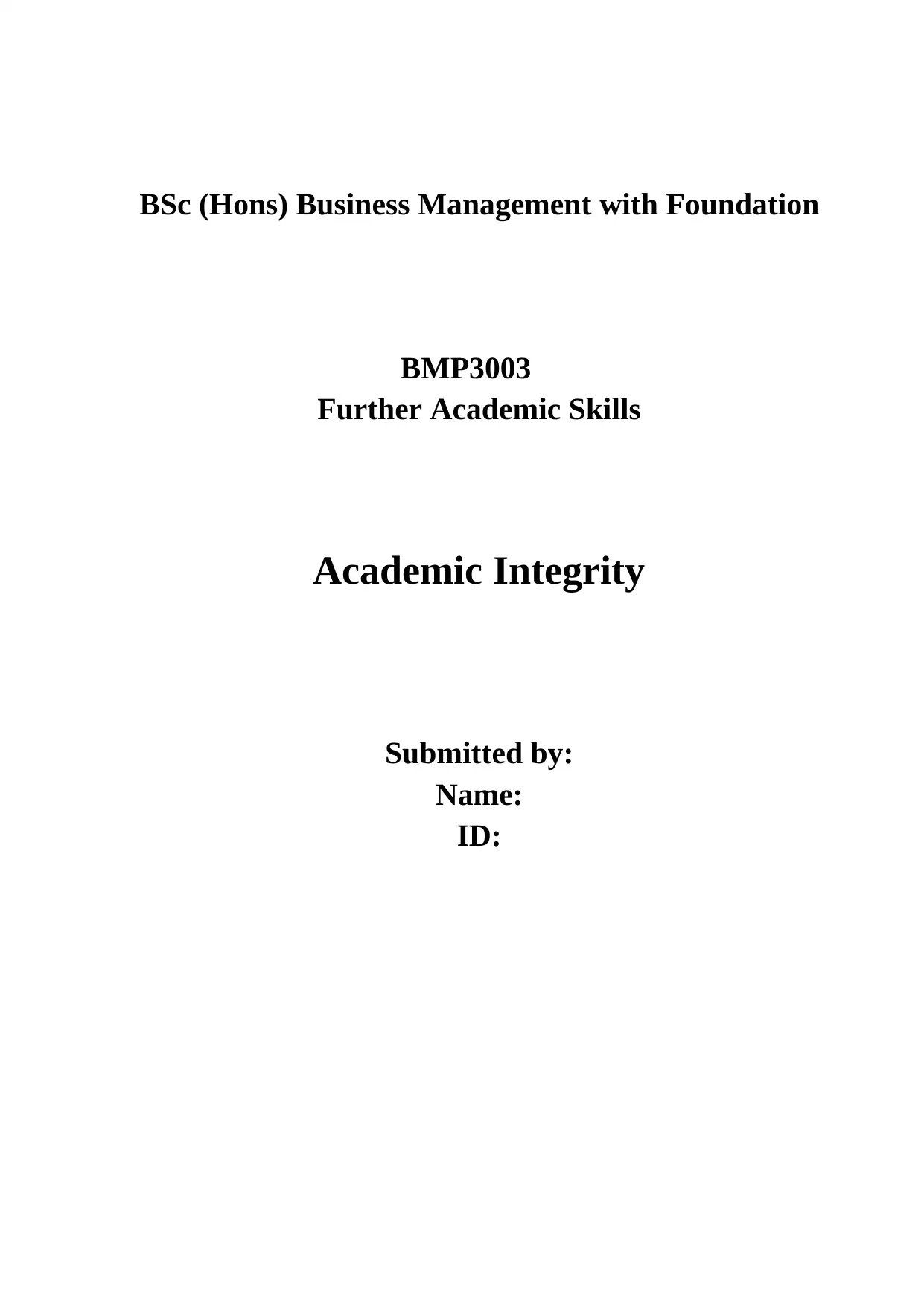
BSc (Hons) Business Management with Foundation
BMP3003
Further Academic Skills
Academic Integrity
Submitted by:
Name:
ID:
BMP3003
Further Academic Skills
Academic Integrity
Submitted by:
Name:
ID:
Secure Best Marks with AI Grader
Need help grading? Try our AI Grader for instant feedback on your assignments.
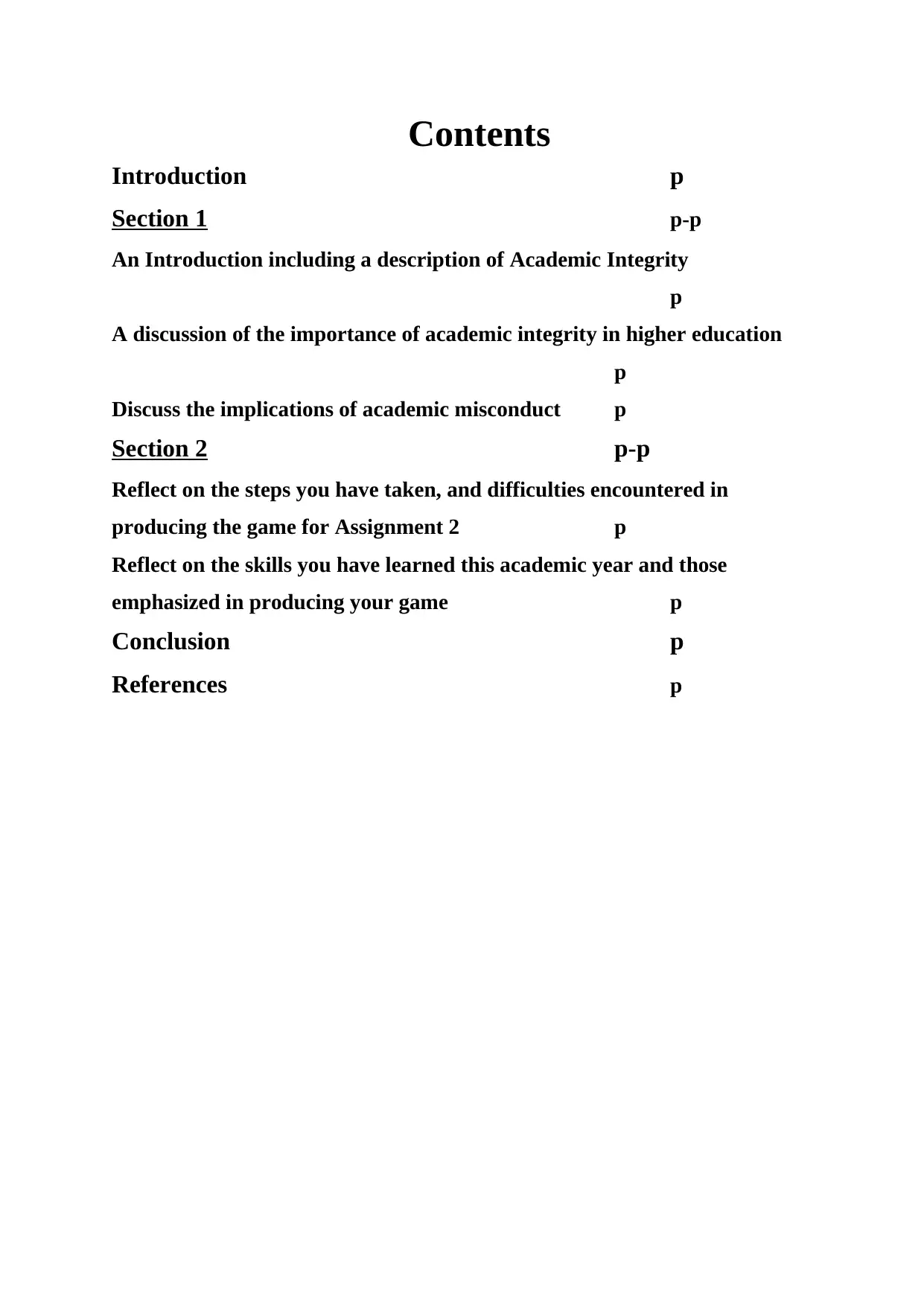
Contents
Introduction p
Section 1 p-p
An Introduction including a description of Academic Integrity
p
A discussion of the importance of academic integrity in higher education
p
Discuss the implications of academic misconduct p
Section 2 p-p
Reflect on the steps you have taken, and difficulties encountered in
producing the game for Assignment 2 p
Reflect on the skills you have learned this academic year and those
emphasized in producing your game p
Conclusion p
References p
Introduction p
Section 1 p-p
An Introduction including a description of Academic Integrity
p
A discussion of the importance of academic integrity in higher education
p
Discuss the implications of academic misconduct p
Section 2 p-p
Reflect on the steps you have taken, and difficulties encountered in
producing the game for Assignment 2 p
Reflect on the skills you have learned this academic year and those
emphasized in producing your game p
Conclusion p
References p
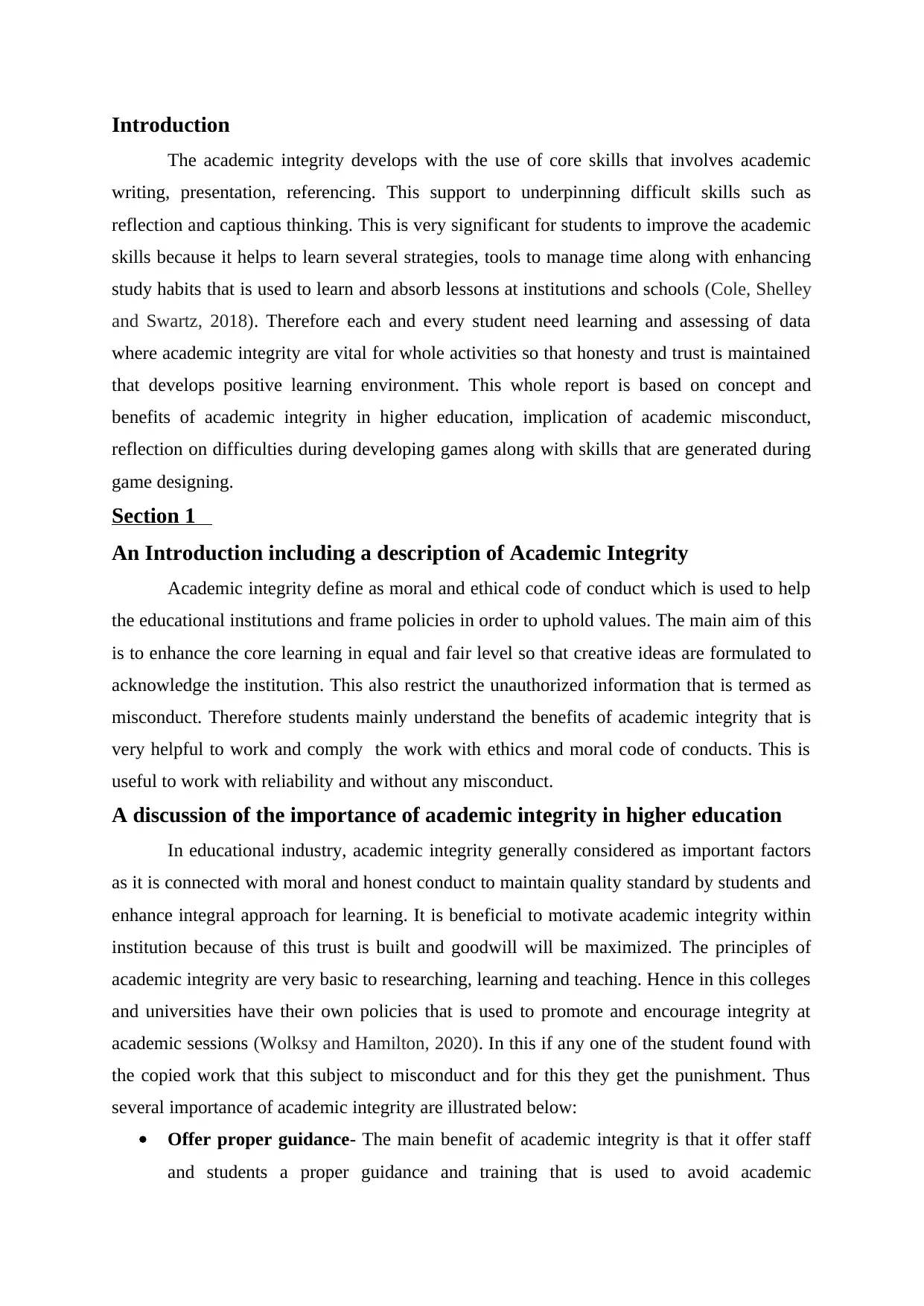
Introduction
The academic integrity develops with the use of core skills that involves academic
writing, presentation, referencing. This support to underpinning difficult skills such as
reflection and captious thinking. This is very significant for students to improve the academic
skills because it helps to learn several strategies, tools to manage time along with enhancing
study habits that is used to learn and absorb lessons at institutions and schools (Cole, Shelley
and Swartz, 2018). Therefore each and every student need learning and assessing of data
where academic integrity are vital for whole activities so that honesty and trust is maintained
that develops positive learning environment. This whole report is based on concept and
benefits of academic integrity in higher education, implication of academic misconduct,
reflection on difficulties during developing games along with skills that are generated during
game designing.
Section 1
An Introduction including a description of Academic Integrity
Academic integrity define as moral and ethical code of conduct which is used to help
the educational institutions and frame policies in order to uphold values. The main aim of this
is to enhance the core learning in equal and fair level so that creative ideas are formulated to
acknowledge the institution. This also restrict the unauthorized information that is termed as
misconduct. Therefore students mainly understand the benefits of academic integrity that is
very helpful to work and comply the work with ethics and moral code of conducts. This is
useful to work with reliability and without any misconduct.
A discussion of the importance of academic integrity in higher education
In educational industry, academic integrity generally considered as important factors
as it is connected with moral and honest conduct to maintain quality standard by students and
enhance integral approach for learning. It is beneficial to motivate academic integrity within
institution because of this trust is built and goodwill will be maximized. The principles of
academic integrity are very basic to researching, learning and teaching. Hence in this colleges
and universities have their own policies that is used to promote and encourage integrity at
academic sessions (Wolksy and Hamilton, 2020). In this if any one of the student found with
the copied work that this subject to misconduct and for this they get the punishment. Thus
several importance of academic integrity are illustrated below:
Offer proper guidance- The main benefit of academic integrity is that it offer staff
and students a proper guidance and training that is used to avoid academic
The academic integrity develops with the use of core skills that involves academic
writing, presentation, referencing. This support to underpinning difficult skills such as
reflection and captious thinking. This is very significant for students to improve the academic
skills because it helps to learn several strategies, tools to manage time along with enhancing
study habits that is used to learn and absorb lessons at institutions and schools (Cole, Shelley
and Swartz, 2018). Therefore each and every student need learning and assessing of data
where academic integrity are vital for whole activities so that honesty and trust is maintained
that develops positive learning environment. This whole report is based on concept and
benefits of academic integrity in higher education, implication of academic misconduct,
reflection on difficulties during developing games along with skills that are generated during
game designing.
Section 1
An Introduction including a description of Academic Integrity
Academic integrity define as moral and ethical code of conduct which is used to help
the educational institutions and frame policies in order to uphold values. The main aim of this
is to enhance the core learning in equal and fair level so that creative ideas are formulated to
acknowledge the institution. This also restrict the unauthorized information that is termed as
misconduct. Therefore students mainly understand the benefits of academic integrity that is
very helpful to work and comply the work with ethics and moral code of conducts. This is
useful to work with reliability and without any misconduct.
A discussion of the importance of academic integrity in higher education
In educational industry, academic integrity generally considered as important factors
as it is connected with moral and honest conduct to maintain quality standard by students and
enhance integral approach for learning. It is beneficial to motivate academic integrity within
institution because of this trust is built and goodwill will be maximized. The principles of
academic integrity are very basic to researching, learning and teaching. Hence in this colleges
and universities have their own policies that is used to promote and encourage integrity at
academic sessions (Wolksy and Hamilton, 2020). In this if any one of the student found with
the copied work that this subject to misconduct and for this they get the punishment. Thus
several importance of academic integrity are illustrated below:
Offer proper guidance- The main benefit of academic integrity is that it offer staff
and students a proper guidance and training that is used to avoid academic
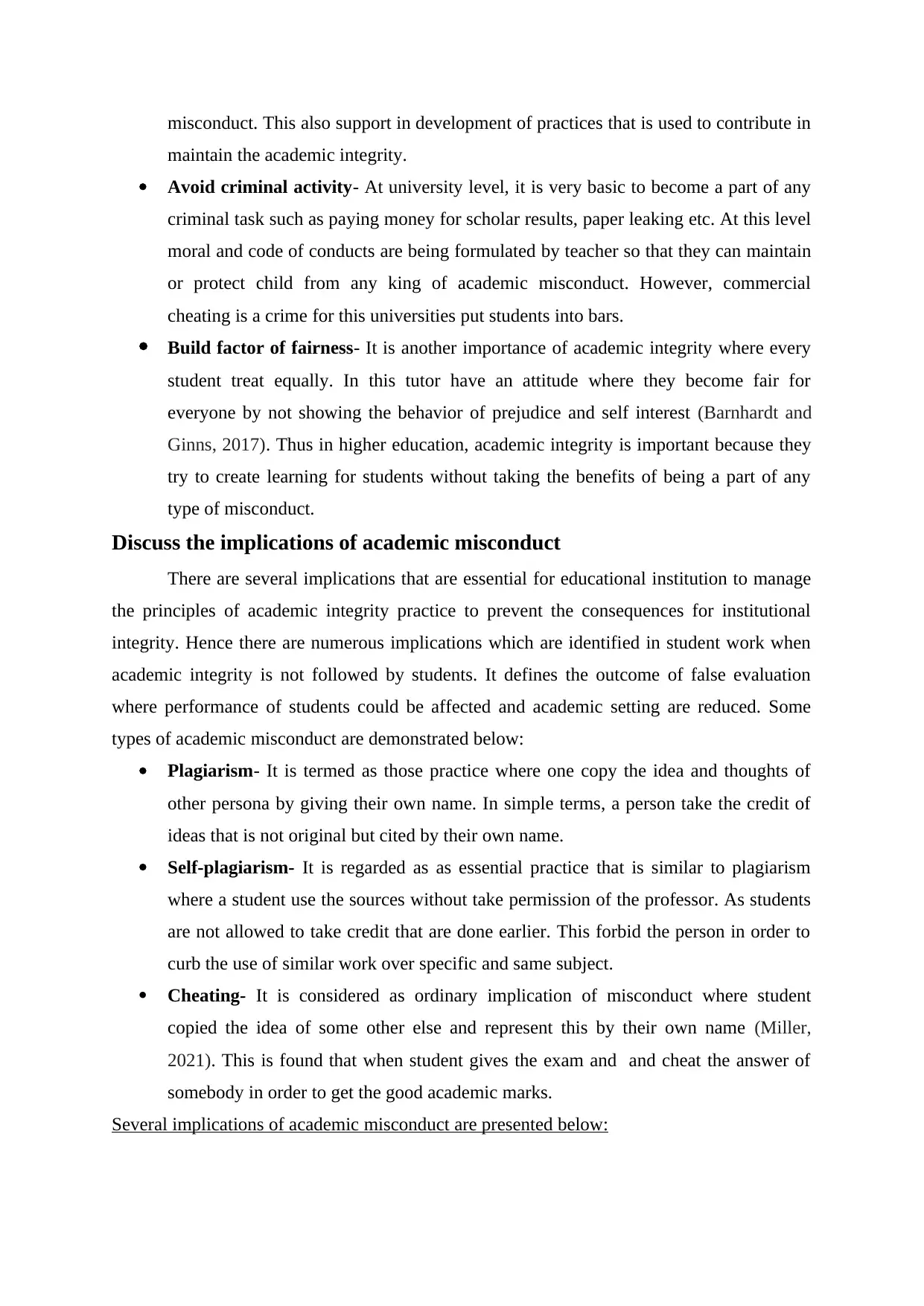
misconduct. This also support in development of practices that is used to contribute in
maintain the academic integrity.
Avoid criminal activity- At university level, it is very basic to become a part of any
criminal task such as paying money for scholar results, paper leaking etc. At this level
moral and code of conducts are being formulated by teacher so that they can maintain
or protect child from any king of academic misconduct. However, commercial
cheating is a crime for this universities put students into bars.
Build factor of fairness- It is another importance of academic integrity where every
student treat equally. In this tutor have an attitude where they become fair for
everyone by not showing the behavior of prejudice and self interest (Barnhardt and
Ginns, 2017). Thus in higher education, academic integrity is important because they
try to create learning for students without taking the benefits of being a part of any
type of misconduct.
Discuss the implications of academic misconduct
There are several implications that are essential for educational institution to manage
the principles of academic integrity practice to prevent the consequences for institutional
integrity. Hence there are numerous implications which are identified in student work when
academic integrity is not followed by students. It defines the outcome of false evaluation
where performance of students could be affected and academic setting are reduced. Some
types of academic misconduct are demonstrated below:
Plagiarism- It is termed as those practice where one copy the idea and thoughts of
other persona by giving their own name. In simple terms, a person take the credit of
ideas that is not original but cited by their own name.
Self-plagiarism- It is regarded as as essential practice that is similar to plagiarism
where a student use the sources without take permission of the professor. As students
are not allowed to take credit that are done earlier. This forbid the person in order to
curb the use of similar work over specific and same subject.
Cheating- It is considered as ordinary implication of misconduct where student
copied the idea of some other else and represent this by their own name (Miller,
2021). This is found that when student gives the exam and and cheat the answer of
somebody in order to get the good academic marks.
Several implications of academic misconduct are presented below:
maintain the academic integrity.
Avoid criminal activity- At university level, it is very basic to become a part of any
criminal task such as paying money for scholar results, paper leaking etc. At this level
moral and code of conducts are being formulated by teacher so that they can maintain
or protect child from any king of academic misconduct. However, commercial
cheating is a crime for this universities put students into bars.
Build factor of fairness- It is another importance of academic integrity where every
student treat equally. In this tutor have an attitude where they become fair for
everyone by not showing the behavior of prejudice and self interest (Barnhardt and
Ginns, 2017). Thus in higher education, academic integrity is important because they
try to create learning for students without taking the benefits of being a part of any
type of misconduct.
Discuss the implications of academic misconduct
There are several implications that are essential for educational institution to manage
the principles of academic integrity practice to prevent the consequences for institutional
integrity. Hence there are numerous implications which are identified in student work when
academic integrity is not followed by students. It defines the outcome of false evaluation
where performance of students could be affected and academic setting are reduced. Some
types of academic misconduct are demonstrated below:
Plagiarism- It is termed as those practice where one copy the idea and thoughts of
other persona by giving their own name. In simple terms, a person take the credit of
ideas that is not original but cited by their own name.
Self-plagiarism- It is regarded as as essential practice that is similar to plagiarism
where a student use the sources without take permission of the professor. As students
are not allowed to take credit that are done earlier. This forbid the person in order to
curb the use of similar work over specific and same subject.
Cheating- It is considered as ordinary implication of misconduct where student
copied the idea of some other else and represent this by their own name (Miller,
2021). This is found that when student gives the exam and and cheat the answer of
somebody in order to get the good academic marks.
Several implications of academic misconduct are presented below:
Secure Best Marks with AI Grader
Need help grading? Try our AI Grader for instant feedback on your assignments.
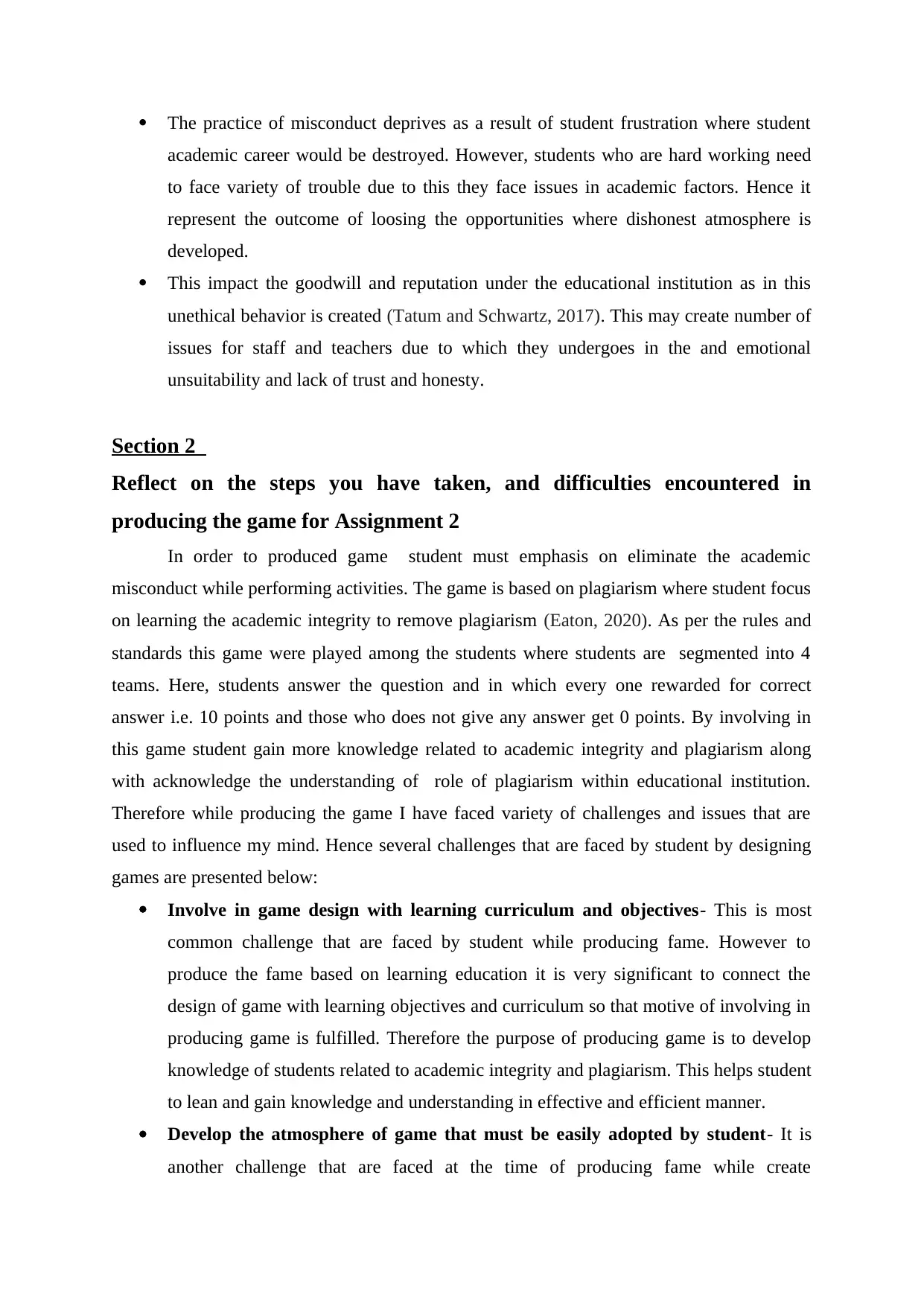
The practice of misconduct deprives as a result of student frustration where student
academic career would be destroyed. However, students who are hard working need
to face variety of trouble due to this they face issues in academic factors. Hence it
represent the outcome of loosing the opportunities where dishonest atmosphere is
developed.
This impact the goodwill and reputation under the educational institution as in this
unethical behavior is created (Tatum and Schwartz, 2017). This may create number of
issues for staff and teachers due to which they undergoes in the and emotional
unsuitability and lack of trust and honesty.
Section 2
Reflect on the steps you have taken, and difficulties encountered in
producing the game for Assignment 2
In order to produced game student must emphasis on eliminate the academic
misconduct while performing activities. The game is based on plagiarism where student focus
on learning the academic integrity to remove plagiarism (Eaton, 2020). As per the rules and
standards this game were played among the students where students are segmented into 4
teams. Here, students answer the question and in which every one rewarded for correct
answer i.e. 10 points and those who does not give any answer get 0 points. By involving in
this game student gain more knowledge related to academic integrity and plagiarism along
with acknowledge the understanding of role of plagiarism within educational institution.
Therefore while producing the game I have faced variety of challenges and issues that are
used to influence my mind. Hence several challenges that are faced by student by designing
games are presented below:
Involve in game design with learning curriculum and objectives- This is most
common challenge that are faced by student while producing fame. However to
produce the fame based on learning education it is very significant to connect the
design of game with learning objectives and curriculum so that motive of involving in
producing game is fulfilled. Therefore the purpose of producing game is to develop
knowledge of students related to academic integrity and plagiarism. This helps student
to lean and gain knowledge and understanding in effective and efficient manner.
Develop the atmosphere of game that must be easily adopted by student- It is
another challenge that are faced at the time of producing fame while create
academic career would be destroyed. However, students who are hard working need
to face variety of trouble due to this they face issues in academic factors. Hence it
represent the outcome of loosing the opportunities where dishonest atmosphere is
developed.
This impact the goodwill and reputation under the educational institution as in this
unethical behavior is created (Tatum and Schwartz, 2017). This may create number of
issues for staff and teachers due to which they undergoes in the and emotional
unsuitability and lack of trust and honesty.
Section 2
Reflect on the steps you have taken, and difficulties encountered in
producing the game for Assignment 2
In order to produced game student must emphasis on eliminate the academic
misconduct while performing activities. The game is based on plagiarism where student focus
on learning the academic integrity to remove plagiarism (Eaton, 2020). As per the rules and
standards this game were played among the students where students are segmented into 4
teams. Here, students answer the question and in which every one rewarded for correct
answer i.e. 10 points and those who does not give any answer get 0 points. By involving in
this game student gain more knowledge related to academic integrity and plagiarism along
with acknowledge the understanding of role of plagiarism within educational institution.
Therefore while producing the game I have faced variety of challenges and issues that are
used to influence my mind. Hence several challenges that are faced by student by designing
games are presented below:
Involve in game design with learning curriculum and objectives- This is most
common challenge that are faced by student while producing fame. However to
produce the fame based on learning education it is very significant to connect the
design of game with learning objectives and curriculum so that motive of involving in
producing game is fulfilled. Therefore the purpose of producing game is to develop
knowledge of students related to academic integrity and plagiarism. This helps student
to lean and gain knowledge and understanding in effective and efficient manner.
Develop the atmosphere of game that must be easily adopted by student- It is
another challenge that are faced at the time of producing fame while create
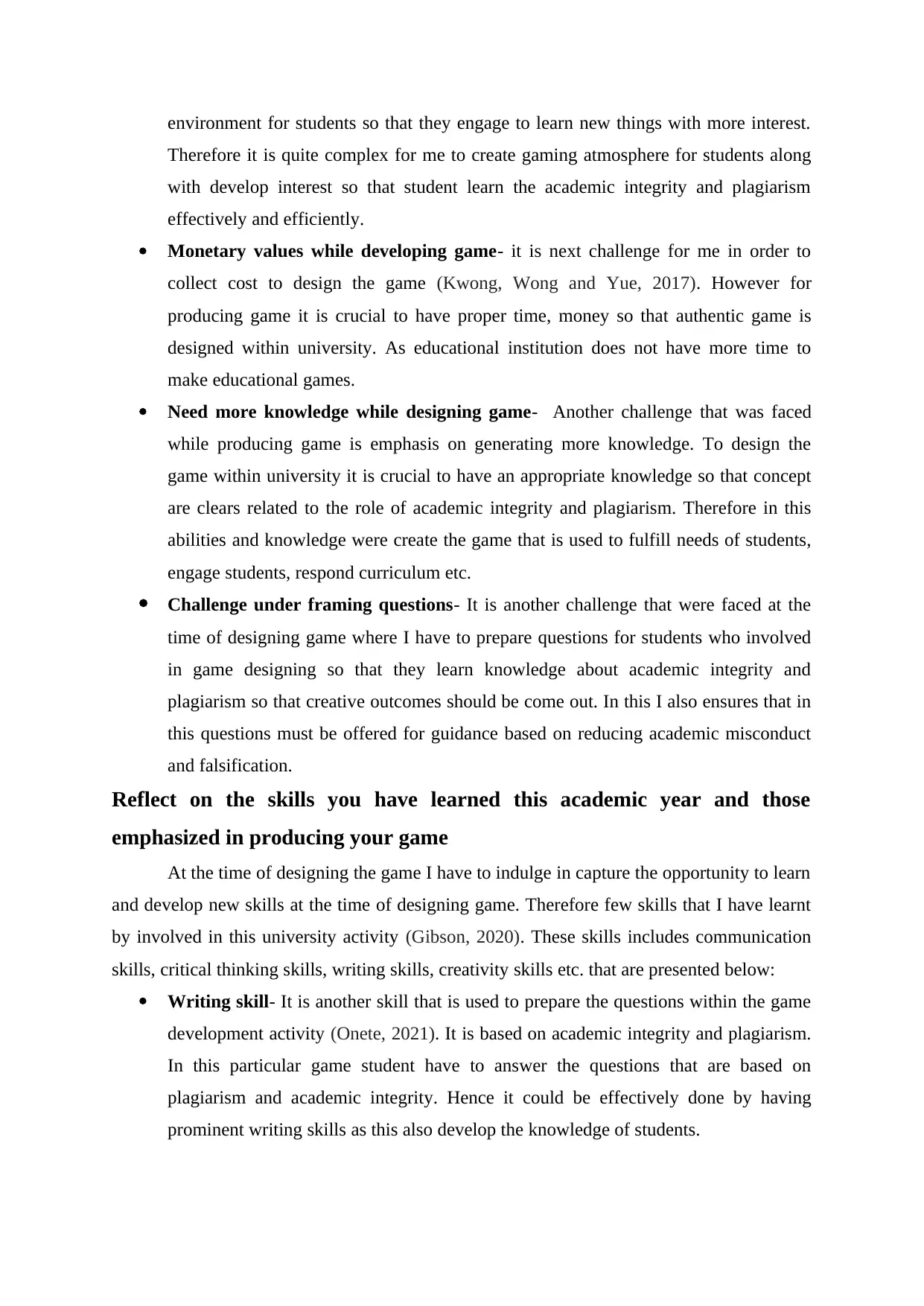
environment for students so that they engage to learn new things with more interest.
Therefore it is quite complex for me to create gaming atmosphere for students along
with develop interest so that student learn the academic integrity and plagiarism
effectively and efficiently.
Monetary values while developing game- it is next challenge for me in order to
collect cost to design the game (Kwong, Wong and Yue, 2017). However for
producing game it is crucial to have proper time, money so that authentic game is
designed within university. As educational institution does not have more time to
make educational games.
Need more knowledge while designing game- Another challenge that was faced
while producing game is emphasis on generating more knowledge. To design the
game within university it is crucial to have an appropriate knowledge so that concept
are clears related to the role of academic integrity and plagiarism. Therefore in this
abilities and knowledge were create the game that is used to fulfill needs of students,
engage students, respond curriculum etc.
Challenge under framing questions- It is another challenge that were faced at the
time of designing game where I have to prepare questions for students who involved
in game designing so that they learn knowledge about academic integrity and
plagiarism so that creative outcomes should be come out. In this I also ensures that in
this questions must be offered for guidance based on reducing academic misconduct
and falsification.
Reflect on the skills you have learned this academic year and those
emphasized in producing your game
At the time of designing the game I have to indulge in capture the opportunity to learn
and develop new skills at the time of designing game. Therefore few skills that I have learnt
by involved in this university activity (Gibson, 2020). These skills includes communication
skills, critical thinking skills, writing skills, creativity skills etc. that are presented below:
Writing skill- It is another skill that is used to prepare the questions within the game
development activity (Onete, 2021). It is based on academic integrity and plagiarism.
In this particular game student have to answer the questions that are based on
plagiarism and academic integrity. Hence it could be effectively done by having
prominent writing skills as this also develop the knowledge of students.
Therefore it is quite complex for me to create gaming atmosphere for students along
with develop interest so that student learn the academic integrity and plagiarism
effectively and efficiently.
Monetary values while developing game- it is next challenge for me in order to
collect cost to design the game (Kwong, Wong and Yue, 2017). However for
producing game it is crucial to have proper time, money so that authentic game is
designed within university. As educational institution does not have more time to
make educational games.
Need more knowledge while designing game- Another challenge that was faced
while producing game is emphasis on generating more knowledge. To design the
game within university it is crucial to have an appropriate knowledge so that concept
are clears related to the role of academic integrity and plagiarism. Therefore in this
abilities and knowledge were create the game that is used to fulfill needs of students,
engage students, respond curriculum etc.
Challenge under framing questions- It is another challenge that were faced at the
time of designing game where I have to prepare questions for students who involved
in game designing so that they learn knowledge about academic integrity and
plagiarism so that creative outcomes should be come out. In this I also ensures that in
this questions must be offered for guidance based on reducing academic misconduct
and falsification.
Reflect on the skills you have learned this academic year and those
emphasized in producing your game
At the time of designing the game I have to indulge in capture the opportunity to learn
and develop new skills at the time of designing game. Therefore few skills that I have learnt
by involved in this university activity (Gibson, 2020). These skills includes communication
skills, critical thinking skills, writing skills, creativity skills etc. that are presented below:
Writing skill- It is another skill that is used to prepare the questions within the game
development activity (Onete, 2021). It is based on academic integrity and plagiarism.
In this particular game student have to answer the questions that are based on
plagiarism and academic integrity. Hence it could be effectively done by having
prominent writing skills as this also develop the knowledge of students.
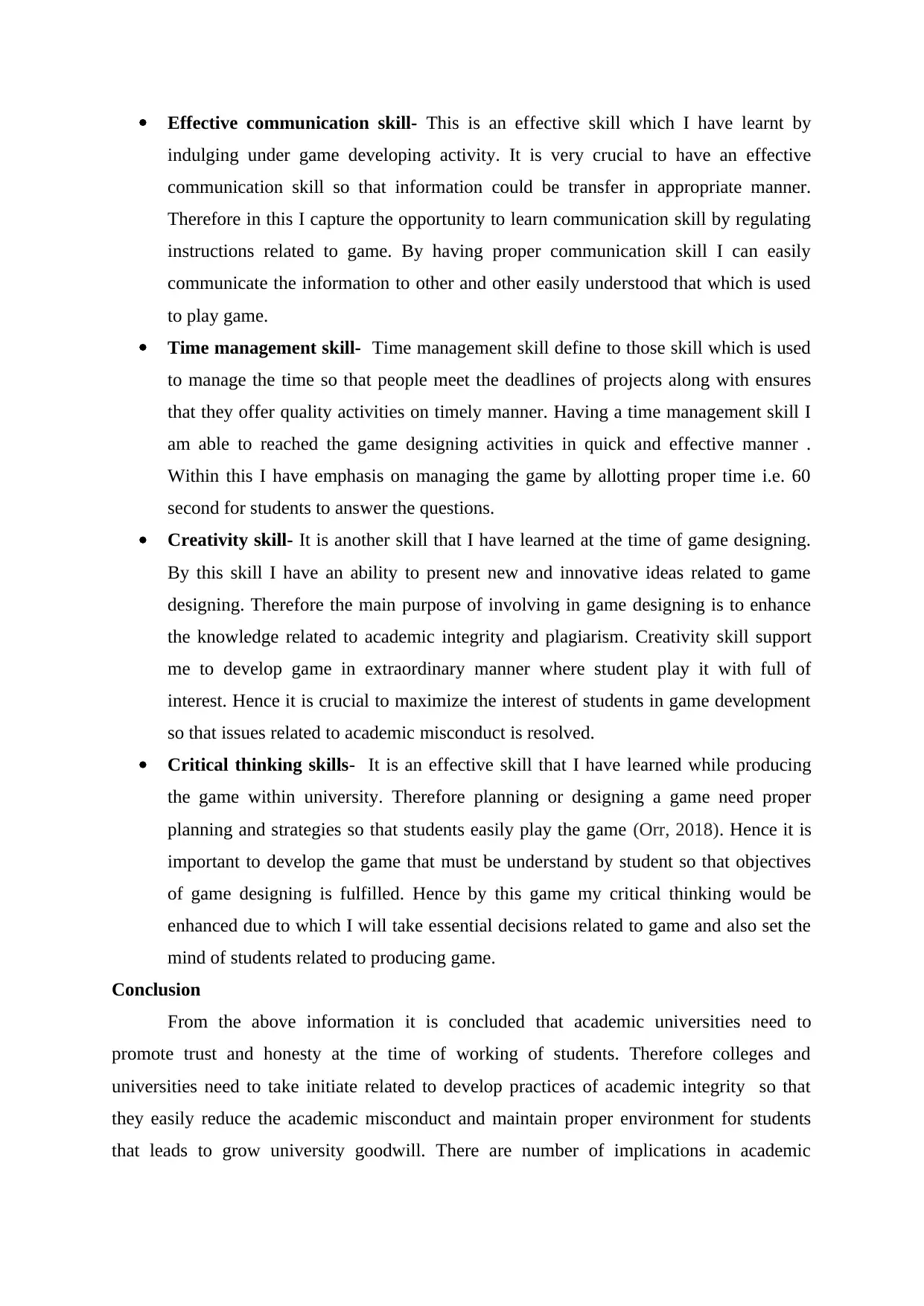
Effective communication skill- This is an effective skill which I have learnt by
indulging under game developing activity. It is very crucial to have an effective
communication skill so that information could be transfer in appropriate manner.
Therefore in this I capture the opportunity to learn communication skill by regulating
instructions related to game. By having proper communication skill I can easily
communicate the information to other and other easily understood that which is used
to play game.
Time management skill- Time management skill define to those skill which is used
to manage the time so that people meet the deadlines of projects along with ensures
that they offer quality activities on timely manner. Having a time management skill I
am able to reached the game designing activities in quick and effective manner .
Within this I have emphasis on managing the game by allotting proper time i.e. 60
second for students to answer the questions.
Creativity skill- It is another skill that I have learned at the time of game designing.
By this skill I have an ability to present new and innovative ideas related to game
designing. Therefore the main purpose of involving in game designing is to enhance
the knowledge related to academic integrity and plagiarism. Creativity skill support
me to develop game in extraordinary manner where student play it with full of
interest. Hence it is crucial to maximize the interest of students in game development
so that issues related to academic misconduct is resolved.
Critical thinking skills- It is an effective skill that I have learned while producing
the game within university. Therefore planning or designing a game need proper
planning and strategies so that students easily play the game (Orr, 2018). Hence it is
important to develop the game that must be understand by student so that objectives
of game designing is fulfilled. Hence by this game my critical thinking would be
enhanced due to which I will take essential decisions related to game and also set the
mind of students related to producing game.
Conclusion
From the above information it is concluded that academic universities need to
promote trust and honesty at the time of working of students. Therefore colleges and
universities need to take initiate related to develop practices of academic integrity so that
they easily reduce the academic misconduct and maintain proper environment for students
that leads to grow university goodwill. There are number of implications in academic
indulging under game developing activity. It is very crucial to have an effective
communication skill so that information could be transfer in appropriate manner.
Therefore in this I capture the opportunity to learn communication skill by regulating
instructions related to game. By having proper communication skill I can easily
communicate the information to other and other easily understood that which is used
to play game.
Time management skill- Time management skill define to those skill which is used
to manage the time so that people meet the deadlines of projects along with ensures
that they offer quality activities on timely manner. Having a time management skill I
am able to reached the game designing activities in quick and effective manner .
Within this I have emphasis on managing the game by allotting proper time i.e. 60
second for students to answer the questions.
Creativity skill- It is another skill that I have learned at the time of game designing.
By this skill I have an ability to present new and innovative ideas related to game
designing. Therefore the main purpose of involving in game designing is to enhance
the knowledge related to academic integrity and plagiarism. Creativity skill support
me to develop game in extraordinary manner where student play it with full of
interest. Hence it is crucial to maximize the interest of students in game development
so that issues related to academic misconduct is resolved.
Critical thinking skills- It is an effective skill that I have learned while producing
the game within university. Therefore planning or designing a game need proper
planning and strategies so that students easily play the game (Orr, 2018). Hence it is
important to develop the game that must be understand by student so that objectives
of game designing is fulfilled. Hence by this game my critical thinking would be
enhanced due to which I will take essential decisions related to game and also set the
mind of students related to producing game.
Conclusion
From the above information it is concluded that academic universities need to
promote trust and honesty at the time of working of students. Therefore colleges and
universities need to take initiate related to develop practices of academic integrity so that
they easily reduce the academic misconduct and maintain proper environment for students
that leads to grow university goodwill. There are number of implications in academic
Paraphrase This Document
Need a fresh take? Get an instant paraphrase of this document with our AI Paraphraser
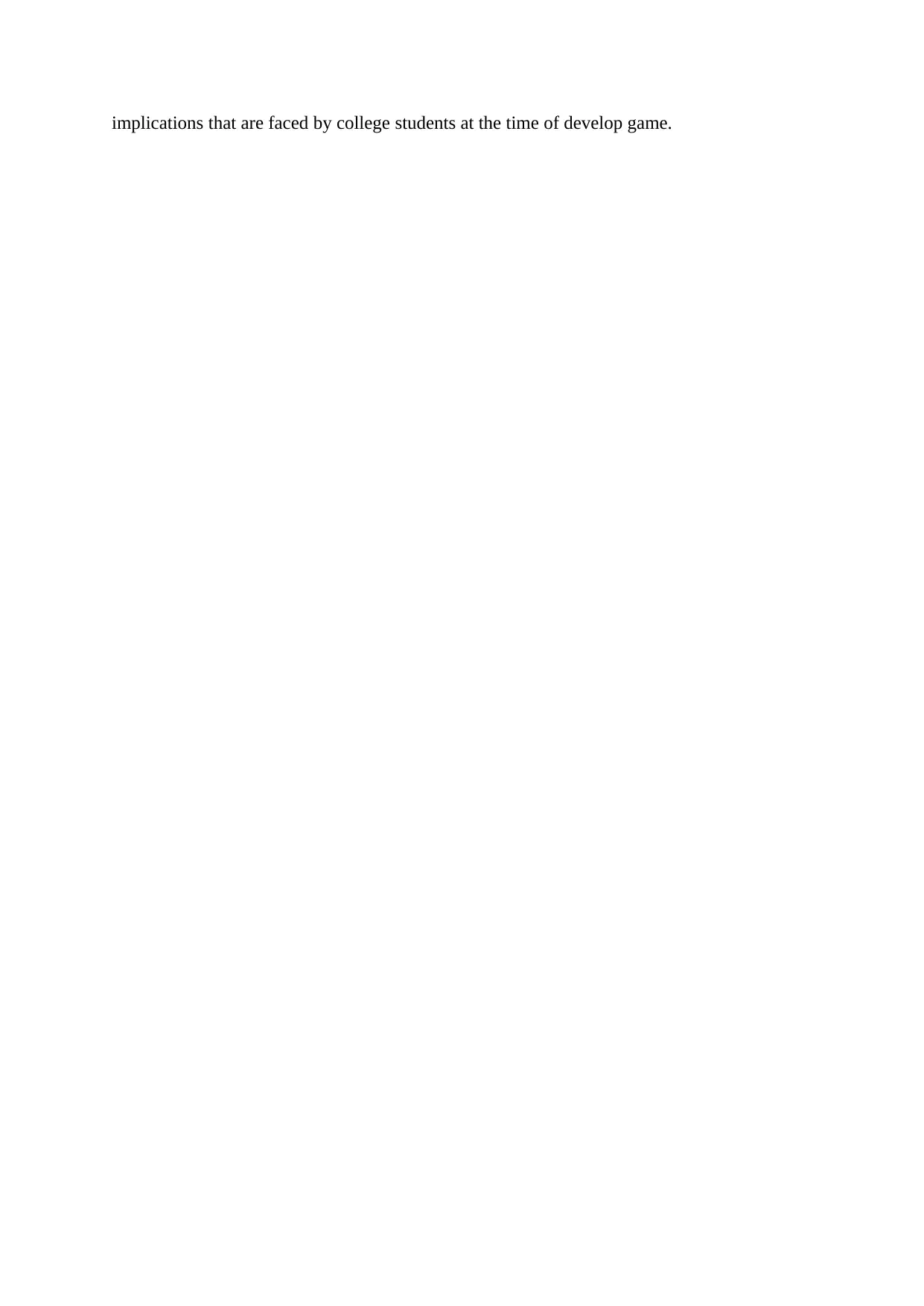
implications that are faced by college students at the time of develop game.
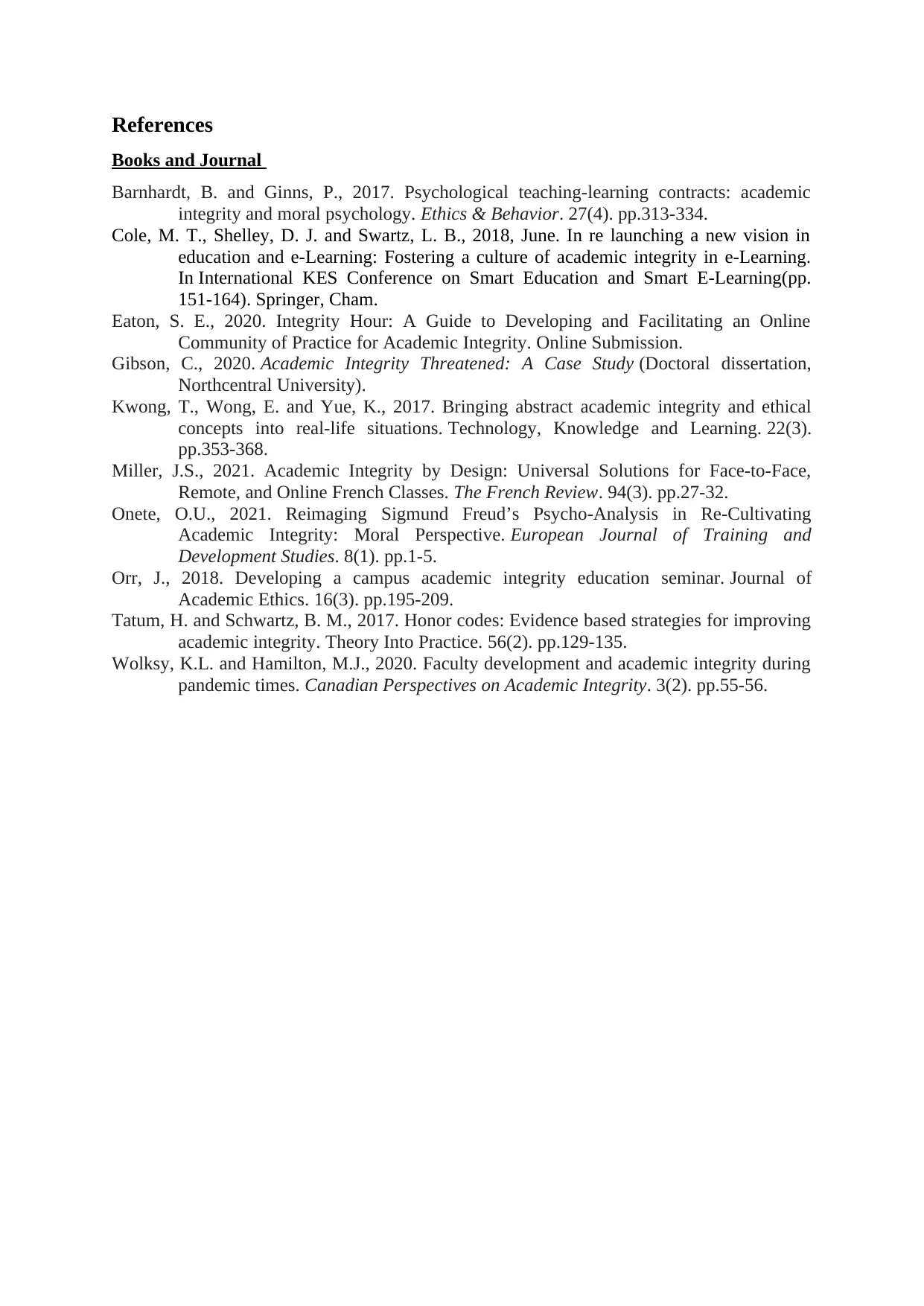
References
Books and Journal
Barnhardt, B. and Ginns, P., 2017. Psychological teaching-learning contracts: academic
integrity and moral psychology. Ethics & Behavior. 27(4). pp.313-334.
Cole, M. T., Shelley, D. J. and Swartz, L. B., 2018, June. In re launching a new vision in
education and e-Learning: Fostering a culture of academic integrity in e-Learning.
In International KES Conference on Smart Education and Smart E-Learning(pp.
151-164). Springer, Cham.
Eaton, S. E., 2020. Integrity Hour: A Guide to Developing and Facilitating an Online
Community of Practice for Academic Integrity. Online Submission.
Gibson, C., 2020. Academic Integrity Threatened: A Case Study (Doctoral dissertation,
Northcentral University).
Kwong, T., Wong, E. and Yue, K., 2017. Bringing abstract academic integrity and ethical
concepts into real-life situations. Technology, Knowledge and Learning. 22(3).
pp.353-368.
Miller, J.S., 2021. Academic Integrity by Design: Universal Solutions for Face-to-Face,
Remote, and Online French Classes. The French Review. 94(3). pp.27-32.
Onete, O.U., 2021. Reimaging Sigmund Freud’s Psycho-Analysis in Re-Cultivating
Academic Integrity: Moral Perspective. European Journal of Training and
Development Studies. 8(1). pp.1-5.
Orr, J., 2018. Developing a campus academic integrity education seminar. Journal of
Academic Ethics. 16(3). pp.195-209.
Tatum, H. and Schwartz, B. M., 2017. Honor codes: Evidence based strategies for improving
academic integrity. Theory Into Practice. 56(2). pp.129-135.
Wolksy, K.L. and Hamilton, M.J., 2020. Faculty development and academic integrity during
pandemic times. Canadian Perspectives on Academic Integrity. 3(2). pp.55-56.
Books and Journal
Barnhardt, B. and Ginns, P., 2017. Psychological teaching-learning contracts: academic
integrity and moral psychology. Ethics & Behavior. 27(4). pp.313-334.
Cole, M. T., Shelley, D. J. and Swartz, L. B., 2018, June. In re launching a new vision in
education and e-Learning: Fostering a culture of academic integrity in e-Learning.
In International KES Conference on Smart Education and Smart E-Learning(pp.
151-164). Springer, Cham.
Eaton, S. E., 2020. Integrity Hour: A Guide to Developing and Facilitating an Online
Community of Practice for Academic Integrity. Online Submission.
Gibson, C., 2020. Academic Integrity Threatened: A Case Study (Doctoral dissertation,
Northcentral University).
Kwong, T., Wong, E. and Yue, K., 2017. Bringing abstract academic integrity and ethical
concepts into real-life situations. Technology, Knowledge and Learning. 22(3).
pp.353-368.
Miller, J.S., 2021. Academic Integrity by Design: Universal Solutions for Face-to-Face,
Remote, and Online French Classes. The French Review. 94(3). pp.27-32.
Onete, O.U., 2021. Reimaging Sigmund Freud’s Psycho-Analysis in Re-Cultivating
Academic Integrity: Moral Perspective. European Journal of Training and
Development Studies. 8(1). pp.1-5.
Orr, J., 2018. Developing a campus academic integrity education seminar. Journal of
Academic Ethics. 16(3). pp.195-209.
Tatum, H. and Schwartz, B. M., 2017. Honor codes: Evidence based strategies for improving
academic integrity. Theory Into Practice. 56(2). pp.129-135.
Wolksy, K.L. and Hamilton, M.J., 2020. Faculty development and academic integrity during
pandemic times. Canadian Perspectives on Academic Integrity. 3(2). pp.55-56.
1 out of 9
Related Documents
Your All-in-One AI-Powered Toolkit for Academic Success.
+13062052269
info@desklib.com
Available 24*7 on WhatsApp / Email
![[object Object]](/_next/static/media/star-bottom.7253800d.svg)
Unlock your academic potential
© 2024 | Zucol Services PVT LTD | All rights reserved.



